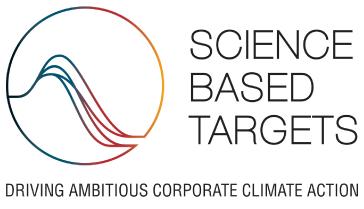- Bridgestone has received Science Based Targets (SBT) certification from SBT initiative (SBTi) for its CO2 emissions reduction targets for 2030.
- Bridgestone is accelerating initiatives toward the realization of its Sustainability Business Framework that ensures the link between sustainability activities and business for contributing to carbon neutrality and a circular economy across the entire value chain.
- These efforts align with a corporate commitment "Bridgestone E8 Commitment" which accelerates transformation to a sustainable solutions company.
Tokyo (February 2, 2023) — Bridgestone Corporation announced today that the Company has obtained approval from Science Based Targets initiative (SBTi)*1 for CO2 emissions reduction target for 2030 set by the Bridgestone Group (Bridgestone).*2
SBTi grants certification to companies that have set science-based targets for reducing greenhouse gas emissions. These targets are expected to cover periods of five to 10 years and to comply with the levels stipulated by the Paris Agreement.*3
Bridgestone's efforts align with the commitments of "Energy: Committed to the realization of a carbon neutral mobility society", "Ecology: Committed to advancing sustainable tire technologies and solutions that preserve the environment for future generations" and "Economy: Committed to maximizing the economic value of mobility and business operations" described in a corporate commitment, the "Bridgestone E8 Commitment."*4
Bridgestone has acquired SBT certification for its medium-term CO2 emissions reduction target for 2030 (Scope 1, 2 and Scope 3). Bridgestone is pursuing its goal of carbon neutrality by working to concurrently enhance its contribution to CO2 reduction and minimize CO2 emissions, with emphasis on the importance of rapid and deep emission cuts. To this end, Bridgestone seeks to achieve ongoing improvements in the energy efficiency of its production activities while ramping up efforts to utilize renewable energy. At the same time, Bridgestone strives to reduce CO2 emissions across the value chain and the entirety of product lifecycles, which spans from raw material procurement to distribution, use, reuse, and recycling. Bridgestone has also maintained a rank of A- or above from CDP*5 for the past seven years, indicating that it is exhibiting excellence in combating climate change.
Bridgestone has placed sustainability at the core of its management and business and strives to realize its vision of "Toward 2050, Bridgestone continues to provide social and customer value as a sustainable solutions company." Bridgestone is accelerating initiatives for contributing to a realization of carbon neutrality and a circular economy for advancing its Sustainability Business Framework that ensures the link between sustainability activities and business across the entire value chain, in all of its "produce and sell," "use," and "renew" phases of its Dan-Totsu Products.
With "Bridgestone E8 Commitment" which serves as guiding vectors to accelerate its transformation, Bridgestone will commit to the realization of a sustainable society by co-creating value together with employees, society, partners and customers while achieving both sustainability and business growth.
Concrete examples of Bridgestone's activities include the following.
Minimize CO2 Emissions
- Promotion of Green and Smart Factories
Bridgestone's 2030 Long Term Strategic Aspiration*6, which was announced on August 2022, describes its efforts to promote the Green and Smart factory. Specially, Bridgestone seeks to source more than 50% of its energy (electricity) from renewable energy by 2023 and challenge to achieve approx. 100% renewable energy (electricity) by 2030. Bridgestone has transitioned to renewable energy for all electricity purchased at all of Bridgestone EMIA's locations in Europe, four plants in Japan (Hikone, Shimonoseki, Tosu, and Kitakyushu), and two plants in China (Tianjin and Wuxi). Bridgestone has also begun using solar power at plants in Thailand, the United States, and Europe.
Enhance Contribution to CO2 Reduction
- EV Tires Equipped with Innovative Tire Technology "ENLITEN®"
Bridgestone is expanding its efforts to supply tires equipped with the ENLITEN innovative tire technology designed to provide a new premium for the era of electric vehicles (EVs) and to deliver superior levels of both environmental and driving performance. This technology helps increase the driving distance and electricity efficiency of EVs by reducing tire rolling resistance. At the same time, ENLITEN-equipped tires can be customized to provide the performance sought in EVs. For example, the ENLITEN technology can be used to lower tire weight or to help conserve resources through improved wear resistance. With ENLITEN, Bridgestone aspires to support safety and peace of mind in mobility while making large contributions to sustainability through reduced CO2 emissions and improved resource efficiency.
- Expansion of Mobility Solutions
Bridgestone provides mobility solutions that help reduce vehicle downtime by using digital technologies to predict vehicle performance and tire wear while also offering highly efficient tire replacement and maintenance services to a wide range of customers. As it seeks to support safety and peace of mind in mobility, Bridgestone is developing and expanding its range of solutions that contribute to reduced CO2 emissions during the customer use phase by helping maximize productivity and economic value.
- Increased Emphasis on Supplier Engagement
In 2021, Bridgestone has partially revised its global sustainable procurement policy. This includes modifications to better shape initiatives to pursue carbon neutrality. Bridgestone also holding explanatory forums on this policy for suppliers in the various regions where Bridgestone conducts business to ensure that they fully understand Bridgestone's policies and activities. Guided by this policy, Bridgestone will continue working together with suppliers to reduce CO2 emissions in upstream areas of the supply chain.
For more information, please refer to Bridgestone 3.0 Journey (2022 Integrated Report) and to the sustainability section of Bridgestone corporate website.*7
- Science Based Targets initiative (SBTi)
SBTi is an international initiative that encourages companies to set greenhouse gas emissions reduction targets based on scientific evidence in order to contribute to the accomplishment of the goals of the Paris Agreement. This initiative is jointly operated by CDP, an international NGO promoting disclosure of environmental information; World Wide Fund for Nature Inc.; the World Resources Institute; and the United Nations Global Compact.
- The near-term targets approved by SBTi
https://www.bridgestone.com/responsibilities/environment/reduce_co2/operations/
- The Paris Agreement is a legally binding international treaty on climate change. Its goal is to hold the increase in the global average temperature to well below 2°C above pre-industrial levels and pursuing efforts to limit the temperature increase to 1.5°C above pre-industrial levels.
- The Bridgestone Group established its corporate commitment, the "Bridgestone E8 Commitment," to help it realize its vision: "Toward 2050, Bridgestone continues to provide social value and customer value as a sustainable solutions company." This commitment will serve as the Group's axis to drive management while earning the trust of future generations. The "Bridgestone E8 Commitment" consists of eight uniquely Bridgestone values starting with the letter "E" (Energy, Ecology, Efficiency, Extension, Economy, Emotion, Ease, and Empowerment) that the Group will commit to creating through distinctly Bridgestone purposes and processes, together with employees, society, partners, and customers to help realize a sustainable society. https://www.bridgestone.com/corporate/news/pdf/2022030101.pdf
- CDP is an international nongovernmental organization that collects and discloses environmental information related to companies and cities. Based on the requests of institutional investors, companies, and other organizations, CDP encourages organizations to disclose information regarding climate change, greenhouse gas emissions, water management, and other environmental concerns and also investigates and evaluates such organizations.
- 2030 Long Term Strategic Aspiration – Bridgestone 3.0 Journey – Roadmap toward becoming a resilient "excellent" Bridgestone
https://www.bridgestone.com/ir/library/strategy/pdf/ENG_lsa20220831.pdf
- For more information, please refer to Bridgestone 3.0 Journey Report (2022 Integrated Report) as well as the sustainability section of Bridgestone's corporate website.
https://www.bridgestone.com/ir/library/integrated_report/index.html
https://www.bridgestone.com/responsibilities/index.html
About Bridgestone Corporation:
Bridgestone is a global leader in tires and rubber building on its expertise to provide solutions for safe and sustainable mobility. Headquartered in Tokyo, the company employs approximately 130,000 people globally and conducts business in more than 150 countries and territories worldwide. Bridgestone offers a diverse product portfolio of premium tires and advanced solutions backed by innovative technologies, improving the way people around the world move, live, work and play.
International disclaimer:
This is a reproduction of a press release published by Bridgestone Corporation on 2/2/2023 and is for general information purposes only. Bridgestone Australia & New Zealand does not make any representation or warranty, express or implied, as to the accuracy, correctness, reliability, validity or completeness of the its contents, particularly in the local context. BSANZ assumes no obligation to update the contents to reflect developments after the date of its publication.




